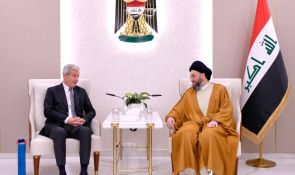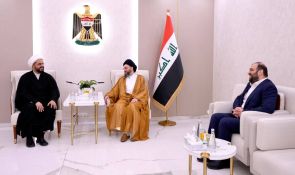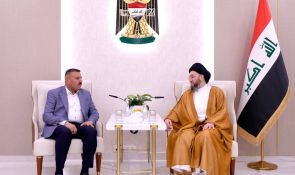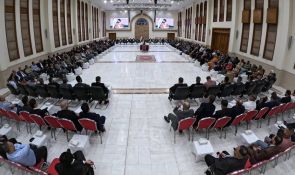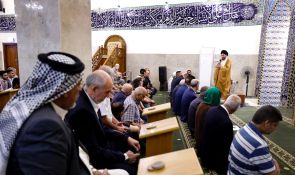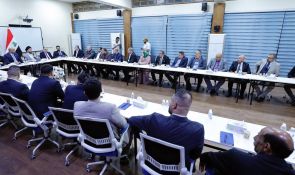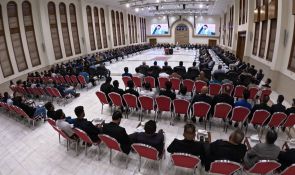Sayyid Ammar al-Hakim calls on the Organization of Islamic Cooperation to hold a conference in Baghdad and to issue a charter titled “Islamic Declaration in Opposition of Violence against Woman.”
Sayyid Ammar al-Hakim, head of the Islamic Supreme Council of Iraq (ISCI), called on the Organization of Islamic Cooperation (OIC) to hold its conference in Baghdad and issue a charter titled “Islamic Declaration in Opposition of Violence Against Woman”, stressing the necessity of establishing a higher national council for woman in the ministry of woman in which all civil society organizations that care about woman’s issues participate, and it has powers that start from consulting and monitoring projects and laws. He urged the Iraqi parliament to issue a law to protect the Iraqi woman from the manifestations of violence in all its forms, to review the legislations in effect and to remove the texts they contain which form a way for inflicting violence against women. He expressed his regret that the ministry of woman is almost ceremonial, lacking the resources which are not granted to it, stressing the necessity to endorse, without reservations, the human rights charters, especially those relevant to woman’s rights and to urge the government to commit itself to the deadlines for submitting periodic reports about the extent of Iraq’s adherence to implementing an agreement ending all forms of discrimination against woman. This came up during the conference of the Islamic day for opposing violence against women which was held on Saturday, December 15, 2012.
His Eminence stressed the social and economic policies, including development planning, must not perpetuate violence against woman or increase its intensity, drawing attention to the necessity for strengthening the ability of all government employees in the legal system, criminal justice and health system in addressing the needs of female victims who survived and to ensure their rights. He explained that this is achieved through training, programs for building capabilities, developing skills and care about the subject of woman’s human security in all its aspects, in addition to preventing and punishing cases of trading in women or any actions that harm or demean one’s dignity. He pointed out to the necessity of working towards the establishment of a comprehensive information system about woman in cooperation with the central system for census and relevant international and national organizations while ensuring the information that results from collecting and analyzing the data are available to the public and ensuring acting upon such data. He called for setting up articles in the state budget for treating, developing and growing the reality of the Iraqi woman in order to achieve the eradication of discrimination and violence against her and to set aside development projects that achieve security and stability for her on all levels.
Sayyid Ammar al-Hakim pointed out that on the first of the month of Safar, one of the ugliest injustices women received manifested itself: It is the day when the women belonging to the family of Prophet Muhammed (Õ), headed by the human huri, Zainab, peace with her, were brought to Yazid, the Umayyad, as captives. He stressed that His Eminence, Hujjatul-Islam wal Muslimeen Sayyid Abdul-Aziz al-Hakim (may his soul be sanctified) was the one who adopted an initiative to regard the first of the month of Safar as an Islamic day for opposing violence against women, explaining that the shining Islamic history cannot be remembered without mentioning the names of the women who formed basic joints in this history, starting with Khadija who embraced the Prophetic message and the Prophet (Õ), passing by Fatima who formed the joining link between the Prophet (Õ) and the wasi (successor to the Prophet [Õ]) and stopping at Zainab who was a revolutionary humanitarian epic by herself just as Imam al-Hussain (Ú) represented a humanitarian revolutionary epic that raised the slogan of freedom, justice, dignity and reform. His Eminence wondered how the Islamic philosophy of the reality of woman and the truth about her role have been distorted, so much so that Islam, which was the first to defend women in the history of mankind, became implicated in the woman’s issue, in the society, and in life, whereas it is the starting point for achieving a real and practical project for the woman renaissance in the Islamic society in particular and the human society in general. He stressed that the answer to this question and to others is the first key to moving the just woman issue in the society and in life, and it is the launching point for achieving a real and practical project for woman’s renaissance in the Islamic society in particular and in the human society in general. He explained that Muslims in particular and humans in general face a serious responsibility in treating this deviation and correcting this distorted image, regarding it as falling within the ladder of priorities because it is the corner stone in building aware Islamic societies that understand woman’s role and rights which Islam granted it. He pointed out that our society label woman as the slogan of honor and purity, but they, at the same time, deal sometimes with woman in a lowly deficient outlook. He regarded the society as practicing some customs and traditions relevant to woman which have nothing to do with the sacred Islamic legislative system, especially the position of woman in the tribal settlements as an item for compensating disputants. His Eminence brought to mind the suffering of woman during the dictatorial epoch saying, “Iraqi woman paid dearly during the past four centuries as a result of political instability in the country, so she was persecuted from both political and social aspects. The dictatorial period dealt with woman in the ugliest forms of utilization and neglect,” stressing that countries grow and prosper in their citizens, not in their resources, and woman is the foundation for building man.


